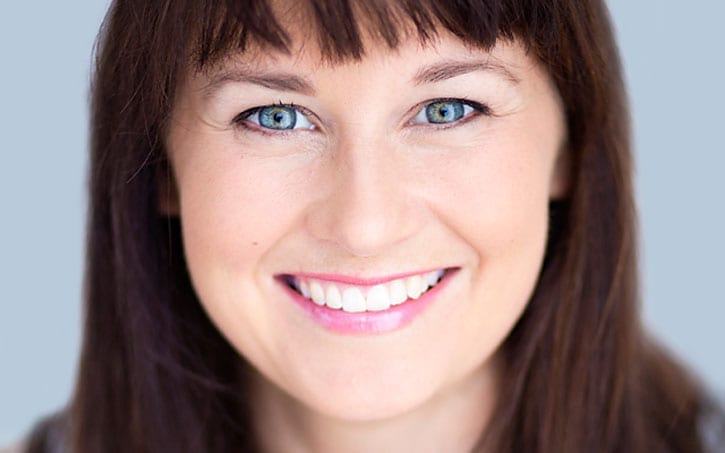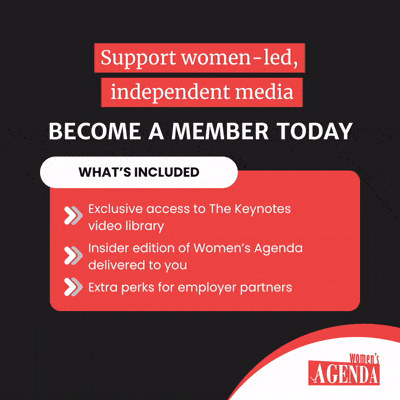Clare Desira was in her teens when one afternoon her parents asked her to collect some clothes and books from her bedroom to donate to a group of refugees that had recently come to Australia. They had fled a war in Kosovo, their home country, and had arrived with nothing. She did as they asked and turned up to school the next day keen to ask everyone to do the same. After she explained the cause, one of her classmates stopped her in her tracks.
“Someone said, ‘There are lots of people in Australia that need our help – so why not help them?'”, Desira recalls. “At school you’re still influenced by what other people think. It felt like I’d had the wind blown out of my sails to be completely honest. I then just got on with being a teenager. I have often thought, though, I wish had the conviction to ask ‘What are you doing to help them?'”
She didn’t, but she has spent a considerable chunk of her career making up for it.
Desira heads up NAB’s volunteering program, which is recognised as one of the best in the country. For someone who determined early on she derived enormous satisfaction from mobilising her friends to contribute to various causes, it is a dream role.
“Thirteen years ago I was doing a leadership program and someone suggested writing down what I really wanted to do and what excited me,” she says. “At that time I wrote down, ‘I love being able to connect people with volunteer opportunities’.”
Last year she facilitated 18,000 volunteer days among NAB employees, which equates to more than $7 million in benefit. At NAB every employee, of which there are approximately 28,000, is entitled to two volunteering days per year. (Employees can apply to their manager for additional days.) Desira works with a small team to arrange where and how those employees spend their days.
“We advertise approximately 22,000 volunteer opportunities exclusively for NAB employees from hundreds of community organisations,” she says. “Employees can then choose from those or something they arrange, within the guidelines we have.”
The program’s overriding objective aligns with the bank’s corporate social responsibility strategy which is to help all Australians have a healthy relationship with money and build prosperous communities. It’s broad, which means the volunteering options are varied, but Desira says the most influential factor is what the employees themselves want to do.
“As a bank we do try to address financial exclusion but the volunteering program isn’t just focused on that. It’s focused on employees’ choices,” she says. “Employees are more engaged if they volunteer but when thinking about employee engagement you have to give them choice. It’s the power in that choice which makes people find their work more meaningful.”
Desira studied business at university and then completed a graduate program with Telstra. After working there for several years she came across to NAB when a role arose in education.
“The role was about creating meaningful opportunities to connect NAB employees with a new education initiative called NAB Schools First which was the biggest corporate community and education partnership at the time,” Desira says. “I was pinching myself because this is what I wanted to do.”
Two years ago, after spending a few years in that role, the opportunity to manage the company’s volunteering program arose which Desira jumped at. She has focused particularly on increasing the amount of skilled volunteering, which is sharing the professional expertise of NAB employees with relevant organisations.
“Skilled volunteering includes HR, marketing, risk, and product improvement,” she says. “We need to sell the skills that are scalable across the bank. There is no point in going out and telling a story about how the social media team have helped an organisation when that is only a small group and they’re already helping. It’s better to look across the bank and sell a story, and skills, around what is scalable.”
Desira uses her own volunteer days each year to teach young people at a leadership program she once attended. Aside from finding her day job challenging and meaningful, she pursues another passion project on the side, called the Top Five Movement.
Desira works a compressed fortnight at NAB which means she completes her full time role in eight or nine days a fortnight. It gives her the flexibility to share her message about gratitude through coaching and public speaking.
“The Top Five movement is about the power of gratitude. I have created vision and tools around research that shows if people demonstrate gratitude they’re healthier, happier, more relaxed and have stronger relationships,” Desira explains. “I started a daily habit of writing down five positive things that have happened every day. They can be big or small but the power is in being really present and recognising things that are happening. If one person can feel all of those things – then what would the world look like if everyone was healthier, appreciated what they had more, lived longer and had more fun? It’s pretty exciting.”
Desira speaks on the topic often and has delivered a popular TedX talk on the simple but powerful impact of gratitude. “For lots of us our natural strength or inclination might not be around gratitude but through a daily habit it rubs off and it’s powerful,” she says.
NAB have been hugely supportive of Desira’s outside endeavours by offering flexible work arrangements, being supportive of her passion and also in allowing her to take study leave.
That she is grateful to her employer is no surprise. But perhaps the one thing she is most grateful for is the way her work makes her feel.
“The average Australian working woman spends about 2000 hours a year at work. When you think about that, it’s important to carve out time to think about what you want to do and how you want to feel,” she says. “If you want to feel alive and confident and purposeful you need to think about that when making choices. How you think and feel on a daily basis is much more important than what might look good.”



